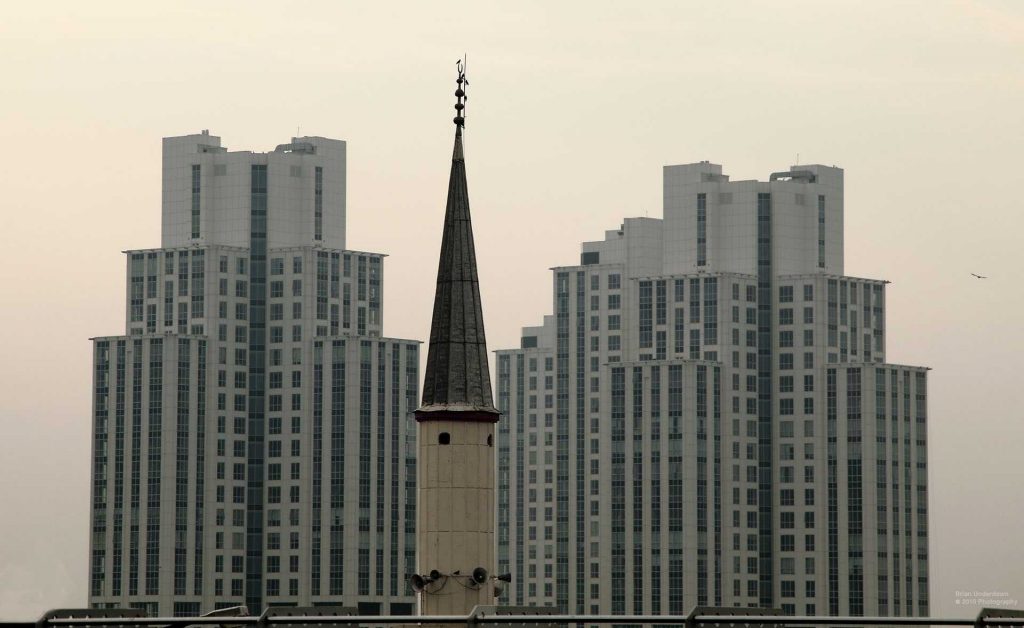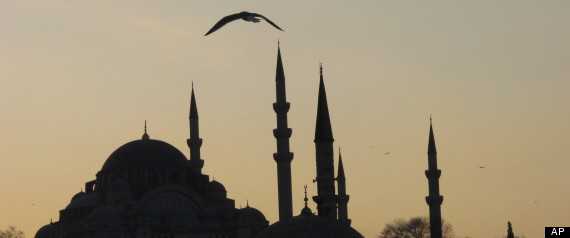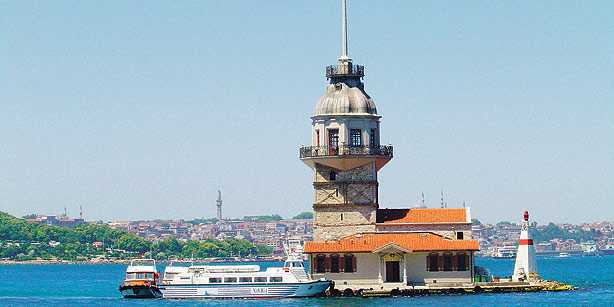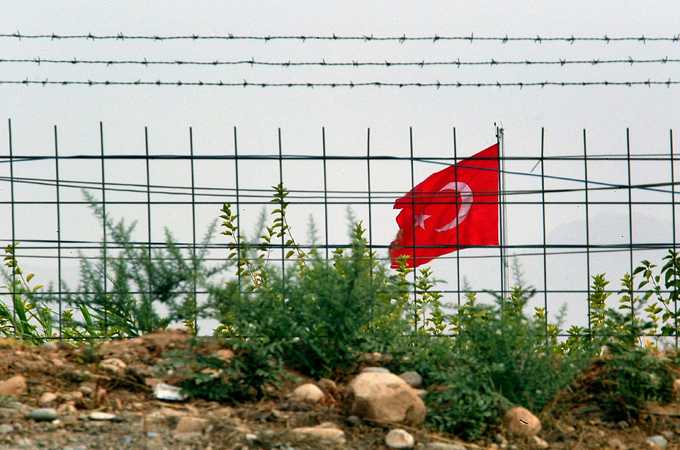|
Friday September 19, 2008
Mark R. Parris, Visiting Fellow, Foreign Policy
Rochester Committee on Foreign Relations
September 10, 2008 —
Some months ago, Turkey ’s Foreign Minister, Ali Babacan came to Washington . As usual, he met with his counterpart, Condoleezza Rice. After their meeting, the two ministers came out and spoke in warm terms, as have all their recent predecessors, about the U.S. – Turkish strategic partnership, its importance and the common values and interests on which it rests. Hold that image.
Here’s another. Last fall, polling by the Pew Research Institute showed approval ratings for the U.S. in Turkey were in single digits. In July, Iran ’s whacko President Mahmud Ahmadinijad visited Istanbul , where he was welcomed by cheering crowds, some of them chanting “death to America .” Iran , by the way, regularly clobbers us in popular opinion polling in Turkey .
What’s wrong with these pictures? If this relationship is so strategic, and so firmly founded on common interests and values, why is our image in Turkey so abysmal? Why is Iran more popular than we are?
I’d like to talk this evening about why Turkey is important to America , about how our relations have gone so wrong in recent years, and about what can be done about it, probably by the next Administration.
Turkey’s Importance
In simplest terms, Turkey is important to the United States for two reasons: where it sits; and what it is.
Where it sits is the easy part. And with an informed audience like this I can deal with it simply by asking you to think of the top ten really hot foreign policy stories of the past year.
Now consider how many of them were in places neighboring or near Turkey . Georgia probably tops the list, with all it implies for Ukraine and the (Turkic speaking) former Soviet states of the Caucasus and Central Asia . Iraq , where the good news of the past year remains hostage to solving pesky little details like the status of Kirkuk , a city Turks have said could be a casus belli. Iran , probably the least problematic border Turkey has had in the last few hundred years and one they’re not anxious to see riled by sanctions or military confrontations. The long-standing but still deadly complex of issues involving Israel and its Arab neighbors in Syria , Palestine and Lebanon . Kosovo and the Balkans, whose experience Russia has used to justify its own actions in Georgia .
And so we come full circle geographically. And I think you see my point. There may be places as important to us on one or a few issues. But I can’t think of any place as important on so wide and overlapping a range of issues. And the issues involved are truly vital to our national interests. That’s why they make headlines.
As we saw just a few weeks ago, Turkey is a place you need to get over or through to get supplies to a Georgia , or to support our forces in Iraq . It’s a place you can’t do without to contain a resurgent Russia . It’s a place you need on your side if you want to isolate an Iran or Syria . It’s the only workable path to get the energy resources of the Caspian and Central Asia to world markets without going through Russia .
And usually, when we need to use or transit Turkey ’s geography, we’re in a hurry. What we have found over and over is that it is always easier in such cases to work with Turkey than to work around Turkey .
So much for where Turkey sits. Turkey is also important to us because of what it is. It is, first, of all, big: in landmass, in population, in its economy. Size always matters. Especially when combined, as is the case for Turkey , with the right qualitative factors.
Here’s one. Most of the places I’ve just talked about, from southern Ukraine through the Caucasus, from Iraq to the Gaza strip, from Israel through the Balkans, were part of the Ottoman Empire . Turks know these places, their actors, their dynamics. They can talk with their leaders in ways we simply cannot. And so you find Turks today acting as mediators between Israel and Syria, between Russians and Georgians, between Syrians and Lebanese, between Iraqi Sunni and Shia Arabs; between Iran and the world.
That’s important and potentially valuable in terms of Western and U.S. interests. Because of course Turkey also happens to be a genuine, functioning democracy, a member of NATO and the OSCE, a candidate for membership in the EU, an active participant each year at Davos, and a poster child for the IMF and World Bank.
Oh, and its population is 99% Muslim.
And since 2002 it has been governed by a party which, in earlier incarnations, described itself as “Islamist.” The Justice and Development Party – or “AKP” as it’s known by its Turkish acronym, doesn’t use that terminology today. It was elected in 2002 and even more decisively a year ago as a centrist party committed to getting Turkey into the EU. But its roots are in a tradition of political Islam which is the issue we have had to deal with abroad since September 2001.
Put it all together and you get a pretty unique profile. In our post-September 11 world, the mere existence of a country like Turkey is an important fact. One that demonstrates in very concrete terms, and contrary to the claims of Muslim radicals, that there is no fundamental contradiction between Islam and the West, between Islam and globalization, between Islam and parliamentary democracy. As in the Cold War, when we faced a different kind of challenge, Turkey is a useful country to have on our side in what promises to be a long struggle against jihadi terrorism.
What’s Broke?
So how did we get to single digits? And are these guys really on our side?
Articles have in fact been written by some of my Brookings colleagues asking “Who lost Turkey .” Their answer is George W. Bush.
That’s a bit too pat. There is no question that Turks, like a lot of others around the world and particularly in Europe and the Middle East, were put off in the opening years of this Administration by its style and agenda, especially the decision to invade Iraq . With Turkey , of course, reactions were particularly strong because Iraq was literally closer to home. The decision to go to war, a bungled attempt to send our forces into Iraq through Turkey, and concern over the initial failure of U.S. occupation policies all had a corrosive effect on our bilateral relations. For the first time since World War II, Turks came seriously to question Washington ’s strategic vision and leadership.
But there were factors on the Turkish side as well. And many were a function of the AKP’s coming to power in late 2002.
Now, Americans tend to make two mistakes in their assessment of the AKP. Some view it as Taliban. Some view it as just a slightly more religious version of the secular parties that ran Turkey for generations, with occasional help from the military.
Both are wrong. The Taliban comparison for the reasons I was describing a few minutes ago: to put it bluntly, you don’t see Taliban at Davos. But it is equally a mistake to underestimate or ignore what are real differences between AKP and its secular predecessors. And those differences have had an impact on our relations.
First, AKP was simply less experienced than the governments it replaced. Like anyone doing something for the first time, they have made mistakes: especially in their first years in power; especially with Washington .
That probably should not have been surprising, since AKP’s leaders had upon taking power had little direct experience in dealing with Americans. AKP’s predecessors had been educated or worked here, or had dealt with Americans throughout the Cold War. For the men who run AKP, their formative experiences with the U.S. were not so positive: specifically, they involved what they saw as our repeated acquiescence in suppression of their parties by Turkey ’s military and secular institutions. There was simply not the same comfort level and instinct to look to the U.S. for leadership that had been there in the past.
There was also quite a different world view, not just in terms of where to draw the line between religious expression and state function at home, but in terms of how Turkey should engage abroad with countries sharing Turkey ’s Ottoman and Muslim legacy.
AKP’s foreign policy architects, unlike their Kemalist predecessors, have seen in Turkey ’s past the inspiration for a more activist diplomacy in the region. The mediator roles I was describing a moment ago reflect a conviction that Turkey can advance not only its own interest, but those of its Western allies, by active engagement with it neighbors.
And that is where the tensions with Washington have come. Because some of the parties with whom Turkey has sought to engage – Iran , Syria , Hamas , Sudan – have been parties that Washington would have prefered to isolate. Indeed, some observers have seen in AKP’s pursuit of so-called “strategic depth” an attempt to move Turkey away from its traditional ties to the U.S. , the West and Israel in a more sinister direction. Labels often obscure more than they clarify, but certain Washington pundits have gone so far as to lump the AKP government in with a broad “Islamo-fascist” movement, along with actors like Al Queda and Taliban.
More seriously, there have been times during the last year when what I think were good faith efforts by the Bush Administration to avoid becoming enmeshed in Turkey’s internal politics have suggested some sympathy with such characterizations. This has, not surprisingly, done little to build trust between Washington and Ankara . It has no doubt contributed to perceptions in Turkey of American hostility or cynicism.
But by far the factor which has done most to cloud bilateral relations over the past decade has been America ’s failure to respond to Turkish pleas for assistance in dealing with a mounting threat from Kurdish terrorists operating out of the mountains of northern Iraq .
Now, this is an issue with a complicated history. I have followed it for years, in and out of government. As best I can tell, there has never been a good reason why we failed to follow though on our declaratory policy that “there is no place in post-Saddam Iraq ” for groups like the PKK – the terrorist organization at issue. As best I can tell, the main reason we did not respond was a bureaucratic one: t he country asking us for help (Turkey) was the responsibility of those parts of our government responsible for Europe; while those with the means to do something about it were responsible for the Middle East and thought they had more pressing concerns – like not losing Iraq.
Whatever the cause, the result was years of bureaucratic deadlock and inaction, which looked to Ankara and the Turkish public like simple non-responsiveness. Hard as it is to believe, this led most Turks to conclude by last year, as Turkish casualties mounted, that our inaction was part of a considered plan to bleed and ultimately to divide Turkey in order to create an independent Kurdish state.
Now, I’m here to tell you that that kind of street rep will hurt your public approval ratings. While Turkish threats to invade Iraq to deal with the problem finally got us off the dime last winter, and while U.S. – Turkish cooperation against the PKK has finally kicked in, our relations suffered a self-inflicted wound that will take years to mend.
Getting it Right
It will also, realistically, have to await a new Administration.
In Turkey , as elsewhere, people have largely written off the Bush Administration, hoping only that it will not create any stark new facts – like a war with Iran – which they will have to deal with. Like a lot of other countries, the Turks heart leads them to like Obama; their head tells them it will be easier to deal with McCain. T he fact is that we will get a bounce in Turkey , as in a lot of places, simply by presenting a new face to the world.
But the dismal record of the past few years offers lessons, if anyone is paying attention, on how to get this important relationship back on track. My recommendations would be the following:
First, the next Administration needs a proper, self-standing Turkey policy. The tendency in Washington is for the urgent to crowd out the important. In that environment, our relations with Turkey will always be hostage to the next crisis for which we need access to their territory, sea or air space – and right now! But that kind of crisis-driven approach could not be better calculated to reduce the likelihood we will get the kind of reliable cooperation we need over time.
Second, the starting point of any coherent Turkey policy will be clarity on the part of all concerned on what kind of country we have in mind when we talk about common values with Turkey . During Turkey ’s 18- month Constitutional crisis over picking a new President and the possible closure of the AKP, U.S. policy was so excruciatingly even-handed as between AKP and its adversaries as to alienate all parties. Worse, by creating an aura of indifference it raised the likelihood that the clear choice of Turkey ’s electorate would be excluded from politics. And that would have been a major setback for America ’s interests.
For what is the irreducible American interest in Turkey ? It is that it not fail. Think Pakistan on Turkey ’s vital geography. We need not and should not associate ourselves with specific parties or politicians in Turkey . But we must leave no room for doubt that, barring clear evidence of hostile intent toward our interests, we will support and work with those who play by the rules and in whom the Turkish people place their trust.
Third, we need to get past the notion that AKP’s penchant for engaging its neighbors is evidence of hostility to our interests. The fact is that in the past four years Washington has ineluctably been drawn closer to Turkey ’s approach – that is, toward engagement – than vice-versa. Since the Bush Administration has already legitimized the tendency to engage with problem nations in the region and in the world, my guess is that the next Administration will be less inclined to make this an issue. If they are smart, they will explore more seriously than their predecessors the degree to which Turkish efforts and unique added value in this part of the world can complement our approach.
Fourth, to overcome the systemic factors that have plagued the conduct of our relations with Ankara in recent years (and before that), the next Administration needs to end the disconnect between the parts of our government that deal with Europe and with the Middle East and Central Asia . Whether you do it with people or by creating a new senior-level position to manage the divide, we cannot afford a repeat of the PKK fiasco, which is simply the most acute symptom of a chronic malady.
Fifth, and a corollary of several of the points I’ve already made, our Turkey policy needs to be embodied in a formal agenda. To be more specific, for a country where so many important U.S. interests overlap, it is critical at the start of a new Administration to get them all on the table, to establish priorities, and to create a follow-up mechanism to keep the whole construct from being derailed by the first crisis. A formal policy review, conducted at the Cabinet level, and staffed thereafter by permanent interagency machinery should be a priority.
Sixth, and finally, this is a relationship that needs quality senior face-time, and lots of it. Turks are not unique in their tendency to do things not for countries or institutions but for people. Turks may be unique in terms of how many things we ask them to do. The next Administration has every interest in creating circumstances that make it easy for Ankara to say yes. That means investing, early on, at the level of the President, his Vice President, his Secretary of State and appropriate Cabinet officers, in developing close working relationships with their Turkish counterparts.
Yes, they will be busy. Yes there will be lots of competing demands. Yes, both the European and Middle Eastern hierarchies in our bureaucracies will have higher priorities on any given day. But as the next President and his team go about seeking to reestablish American credibility and leadership abroad, some countries will be able to help us – or hurt us – more than others. Turkey has the potential to score high on either list.
********************************************************
|






